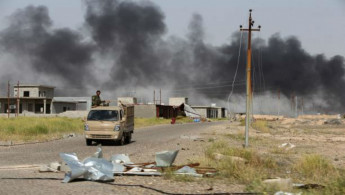IS advances in Iraq threaten Jordan's economy
Jordan fears the economic impact of the Islamic State group taking control of its border with Iraq and cutting off imports and exports with its larger, resource-rich neighbour.
Economists believe the IS' control over large parts of Iraq's Anbar, which borders Jordan, have dealt a severe blow to Jordan's economy, which is highly dependent on exports to Iraq.
Tough times ahead
| According to Hatahet, if the IS takes over Anbar completely, trade between Jordan and Iraq will come to a complete halt. |
A few days ago, the Anbar provincial council warned the IS was very close to taking over all of the province.
Ayman Hatahet, the chairman of Jordan's Chamber of Industry, told al-Araby al-Jadeed that the country's private sector was extremely concerned about developments in Iraq.
He said IS control of Anbar would halt all trade between Jordan and Iraq.
According to the Jordanian Department of Statistics, Jordan's exports to Iraq declined by 6.45 percent between 2013 and 2014, and by 16 percent during the first two months of 2015 compared with the same period in 2014.
"Jordan's economic costs will rise, especially with expectations of a new wave of Iraqi refugees, in addition to security and military costs, putting the country in an increasingly difficult situation," said Hatahet.
Jordan has banned Jordanian vehicles from crossing into Iran because of the dangerous security situation.
According to Hatahet, who is also a board member in the Jordanian Central Bank, the Chamber of Industry is trying to find new export channels including shipping.
Jordan's exports hemmed in by wars
Omar Abu Wishah, the chairman of Jordan's Exporters Association said that Jordan's exports were under siege from all directions.
| IS advances have forced exporters to take alternate roads between Amman and Baghdad, leading to a 300 percent increase in transport costs. |
"We have already lost the Syrian market, the best route to Europe and many other areas. Today, we are about to lose the Iraqi market," he said.
Khalil al-Haj Tawfiq, the head of the Union of Food Commodities Merchants, told al-Araby that the IS collects fees for imports to Iraq when it can, at a rate that depended on the commodity being transported.
He added that every foreign (non-Arab) truck carrying medicines has to pay $4,000, while Arab exporters have to pay $2,000. Trucks carrying other commodities have to pay $300-500 to be allowed into the Iraqi market.
Mohammad Khair Daoud, head of Jordan's Truckers Association, told al-Araby that the transport sector would be one of the most affected sectors by the battles in Anbar, and could lead to a complete halt of land transport.
Daoud also said the sector's losses may increase after the effective closure of its most important destinations, Syria and Iraq. He added the losses the sector was suffering were increasing, reaching $600m so far due to the turmoil in both countries.
This is an edited translation from our Arabic edition.



